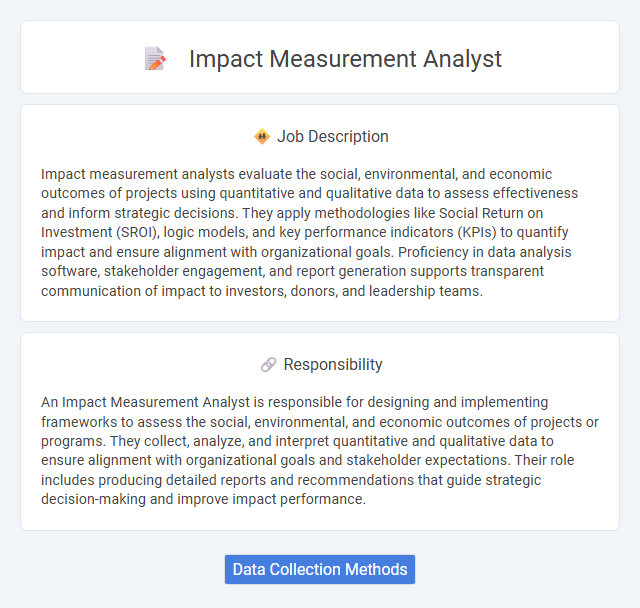
Impact measurement analysts evaluate the social, environmental, and economic outcomes of projects using quantitative and qualitative data to assess effectiveness and inform strategic decisions. They apply methodologies like Social Return on Investment (SROI), logic models, and key performance indicators (KPIs) to quantify impact and ensure alignment with organizational goals. Proficiency in data analysis software, stakeholder engagement, and report generation supports transparent communication of impact to investors, donors, and leadership teams.
Individuals with strong analytical skills and a passion for social or environmental causes are likely to be well-suited for an Impact Measurement Analyst role. Those who are comfortable working with data, extracting meaningful insights, and communicating results effectively may find this job fulfilling. Candidates who thrive in roles requiring attention to detail and a commitment to measuring outcomes might have a higher probability of success in this position.
Qualification
An Impact Measurement Analyst requires a strong foundation in data analysis, statistics, and social sciences, often holding a degree in economics, social research, or business analytics. Proficiency in statistical software such as SPSS, R, or Python and experience with impact evaluation methodologies like Theory of Change and Social Return on Investment (SROI) are essential qualifications. Strong communication skills are necessary to translate complex data into actionable insights for stakeholders and to support evidence-based decision-making in social and environmental programs.
Responsibility
An Impact Measurement Analyst is responsible for designing and implementing frameworks to assess the social, environmental, and economic outcomes of projects or programs. They collect, analyze, and interpret quantitative and qualitative data to ensure alignment with organizational goals and stakeholder expectations. Their role includes producing detailed reports and recommendations that guide strategic decision-making and improve impact performance.
Benefit
An Impact Measurement Analyst likely plays a crucial role in helping organizations quantify the effectiveness of their programs and initiatives. Their work probably enables better decision-making by providing data-driven insights into social, environmental, or economic outcomes, leading to improved strategic planning. This role may significantly enhance resource allocation, ensuring investments generate maximum positive impact.
Challenge
Impact measurement analyst roles likely present challenges related to accurately quantifying social and environmental outcomes amid complex, multifaceted variables. The task probably requires navigating incomplete data sets and applying rigorous analytical frameworks to generate reliable insights. Balancing stakeholder expectations with methodological constraints may further complicate the evaluation process.
Career Advancement
An Impact Measurement Analyst leverages data analytics and evaluation methodologies to assess the social and environmental outcomes of projects, driving strategic decision-making. Mastery in quantitative analysis, stakeholder engagement, and impact reporting opens pathways to senior roles such as Impact Manager or Sustainability Consultant. Expertise in tools like impact frameworks (IRIS+, GIIRS) and ESG metrics further enhances career progression opportunities within nonprofits, government agencies, and corporate sustainability divisions.
Key Terms
Data Collection Methods
Impact measurement analysts employ diverse data collection methods such as surveys, interviews, and observational studies to gather qualitative and quantitative information. They utilize digital tools and software platforms for real-time data capture and accuracy improvement. This rigorous data collection enables precise assessment of program outcomes and informs strategic decision-making.
 kuljobs.com
kuljobs.com